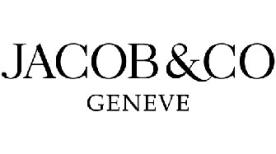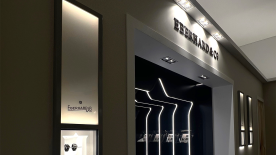Before we even get started, let's agree to leave the clichés behind. Yes, Benjamin Arabov is a young CEO taking over the family business. Yes, he is of the generation known as the Millennials, and furthermore in the contentious zone that some cultural anthropologists consider the liminal years between Millennials and Generation Z. And yes, he's into TikTok.
Now, let's spin out those last three sentences a little further. Benjamin Arabov is the rare CEO whose early life was saturated in the experience of traditional luxury, who then established himself in the world of tech, two domains that are often painted in direct opposition to each other, earning him a spot on Forbes' latest 30 under 30 list. He is a Millennial, a group that has been misunderstood, misrepresented or quite simply missed by traditional luxury brands, making his appointment as CEO of Jacob & Co. one of the most potentially disruptive and seismic events for the industry in the years to come. Thirdly, his native familiarity with the landscape of social media has led the family business into the 21st century with astonishing speed, transitioning to online sales fluidly when 2020 shut the whole world down. All this has allowed Jacob & Co. to enact one of the most spectacular NYC-based pivots since Ross, Rachel and Chandler tried to get a sofa up a stairwell (based on this pre-Y2K pop-culture reference, it is extremely clear which generation this writer is from). And unlike the hapless would-be furniture movers in the world's most influential sitcom, Jacob & Co. succeeded.
In one of his very first interviews as Jacob & Co. CEO since he took on the role, Benjamin Arabov sits down with WorldTempus to share his take on digital strategy, the paradigm shift towards online sales, and how to crisis-proof your company.
First of all, congratulations on taking over the reins of an amazing business with such a cool range of products and partnerships. Before accepting this position, you were active in the digital sphere, as an entrepreneur who worked with startups and companies to help their digital transformation. Did you always know at the back of your mind that one day you would be back at Jacob & Co., bringing your experience back into the family business?
I started out working in the family business back when I was in school, over summer break. When I went to college and had classes three days a week or something, I would work two days a week. At 19, I left the family business to explore digital advertising, but I left telling my father that I'd be back with all this knowledge, strategies, experience that I could bring to Jacob & Co. That was always the goal. My father is old-school; he believes in keeping the business in the family, so it was hard for me to leave — my older brother was doing his own thing and my other brother was too young… I was the only one involved in the company, and I told him I'd be back in a few months to soften the blow. Well, a few months turned into 10 years, but now my father really sees the value of my experience outside of the company, because of what I'm bringing back to it. I've been advising the Jacob & Co. digital team since 2017, we’ve seen significant growth in our social media and digital presence, which has helped us grow consistently over the past few years.

And you know, we have such amazing products. Our watches are made for social media. You don’t have to wait for the watch trade shows to launch them. They are literally perfect for social media. We had, like, 200,000 followers in 2017, which then grew to 2.5 million across all our social media channels.
How did you then go from consulting with the brand on their digital strategy to taking the CEO position?
It felt right for me to make this transition late last year, both for me and my father, you know. The business is growing at a really healthy rate, and he just had too much going on and needed my help, so I was happy to step in.
You mentioned that your father has an approach that could be described as old-school, and he’s famed for his one-on-one relationships that he builds with customers and friends of the brand. You, on the other hand, have an approach that’s been shaped by the tech world, how outreach is handled in that sphere. Is it purely a generational shift, or is this really how the world of communication works now?
The new way is a little bit less personal because it's not face-to-face physical interaction, but this is how my generation communicates, and now even people from the older generations have adopted it too. And although it’s less personal, there is a connection there, and that connection drives the effort behind the content that we produce. We produce content that’s designed to make people feel an emotional reaction, to get them excited about the products that we create. In my opinion — and I’m biased, of course — we’re producing incredible content at a rate that our competitors aren’t. And we want this content to resonate.

If we can take a broader view, over the past few years, there's been a shift when it comes to people needing to see something physically in front of them. For example, the majority of sales that we make today are digital. Either somebody reaches out to us on email or on the phone. They purchase the watch through electronic means, and they receive it at whatever location they’re at. Back in the day, I feel like that would be rare, because they would want to see it, feel it, put it on. But today, our content provides that experience. The images or videos we produce are enough to lead to purchase, and we’re not talking small purchases here. We’re talking hundreds of thousands of dollars, and our customers have that kind of trust in us that they’re able to make a purchase like that over the phone without even seeing the piece.
Can you share with us a particular example of that kind of situation?
When I first started working on Jacob & Co.’s social media, back in 2017, we had just started working with various influencers who are specifically focused on watches. We did a sort of test where we launched a watch through just one single influencer, so we could completely isolate that variable. It was successful — we sold the watch [an Epic SF24 retailing for $69,000] purely through the activity we did with one influencer. It wasn’t released anywhere else. That showed us that if we produce high-quality content and we give it to the right person to show to the world, we can have success with selling a piece. So we took that momentum and continued to grow with it.
What was your father’s reaction to the results of this test?
The whole influencer thing was relatively new for somebody like my father. So when I proposed this test to him, I said, okay, we're going to isolate it, and we’ll be able to see if there are direct results. And you know, that’s very hard to do in this industry — it’s difficult to identify where sales come from and how interest is created. When my father saw the impact of what we did, he and I both recognized that the future lies in shifting things to the digital sphere and creating that growth.
It’s become quite common to kind of make fun of the term “influencer”, but I don't think I’ve ever heard a story quite like that — a story that illustrates so clearly a causal relationship between working with influencers and making a sale. It’s almost scientific in its approach.
It was the only way, because I knew that my dad would be sceptical about investing a lot of money into digital unless we were able to prove that direct relationship between using influencers and making a sale. That was just the first of many, and as we continued to replicate that strategy, the successes multiplied. Now the majority of our marketing budget is in digital, because of those few initial tests we made back in 2017.
In any given month, we could be working with 30 to 50 different influencers, and then we have a huge community that amplifies us very organically, because they bring that viral effect to our content, which helps them as much as it helps us.
In a sense, it's quite smart, because it’s quite a crisis-proof strategy, right? In the past, your products would get exposure on the red carpet, at high-visibility events. Content creators and influencers don’t need events to come out with stuff that is highly effective.
Absolutely, this is a very exciting topic, because we were really able to see this coming to fruition last year during the pandemic, with zero events and red-carpet opportunities. Just with the digital ecosystem we built starting in 2017. We had everything — rapid content creation, digital monetisation, digital customer service. So in spite of the craziness that was 2020, we actually had our best year ever. The strategy really paid off for us.

I also want to add that the backbone to all that was the data initiative that I started implementing in 2017. Our data is extremely granular, whether it's our data or our influencer data. We have a whole system to analyse this data, and because we have hotspots like China, the Middle East or the US, that’s where we focus our efforts, analysing the data and doubling down to expand our activity.
Don't miss the second part of this extensive interview, where Benjamin Arabov talks about the most expensive watch he's sold on social media, what ultra-high net-worth consumers in different parts of the world are looking for, and what's coming next in the exciting world of creative collaborations with Jacob & Co.





